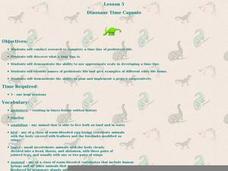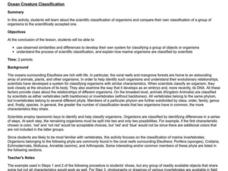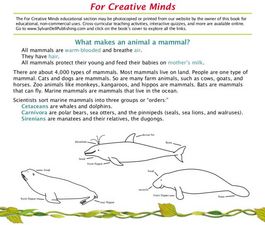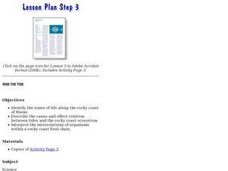Curated OER
Mammals of Fields, Meadows, and Hedgerows
In this mammals instructional activity, learners research the internet to find information and answer short answer questions about mammals of fields, meadows, and hedgerows. Students complete 12 questions.
Curated OER
Animal Brochures
Fourth graders work in pairs to research an animal. They fill in an animal data form in order to become experts about the animal they choose. They use the listed criteria to design a six sided brochure that includes graphics of the...
Curated OER
Focus on Food Chains
Third graders collect and analyze data about food chains. They conduct Internet research about the habitat of a selected organism, write a narrative, and create a computer slideshow using Kid Pix computer software that illustrates the...
Curated OER
What Is a Species?
Students are able to recognize that scientists use different definitions of species. They are able to assess the strengths and limitations of species definitions depending on their context. Students are able to use definitions of...
Curated OER
Create a Creature
Young scholars design, build, draw, or bake a creature of their choice and present to the class. They write a paper including the creature's habitat, method of getting energy, their creature as a producer or consumer, predator or prey...
Curated OER
Crustacean Critters
Students explore the habitats of hermit crabs. In this crustacean lesson, students discover what animals need to survive. Working with live hermit crabs, students explore how hermit crabs have adapted to their habitats.
Curated OER
Bones and Muscles
Third graders are introduced to bones as the body's means of support and protection. They research bone facts and conduct an experiment with chicken bones. They identify and observe involuntary muscles at work.
Curated OER
Ocean Market
Students research how: The ocean is the source of many materials, from ores mined from its depths to relaxing mineral salts for a bath. Exquisite mother-of-pearl inlay, decorative shells, and pearl jewelry are found in gift shops...
Curated OER
Water,It's Special
Students describe the three forms of water. Students list reasons why water is necessary. Students access the Internet to complete Prediction lab report worksheets and FCAT-Style Questions worksheets.
Curated OER
Pheed the World: Edible Phyla
Students discuss the contributions of different organisms to our world. In this biology lesson, students research countries with limited food supply. They create an improvement plan for a fictitious country assigned to them.
Curated OER
Dinosaur Time Capsule
Third graders research prehistoric life using educational software. They design a prehistoric life while showing the use of appropriate scale and names for the prehistoric life. They follow an internet link to participate in a virtual...
Curated OER
The Chordates
Pupils study the characteristics of organisms that are a part of the phylum Chordata. In this organisms instructional activity students identify mammals that are native to Saskatchewan.
Curated OER
Ocean Creature Classification
Students develop their own system for classifying a group of objects or organisms using observed similarities and differences. They investigate the process of scientific classification, and explain how marine organisms are classified by...
Curated OER
Achy, Breaky Nerve
Learners will develop models of neurons to understand the function of myelin as it applies to the normal and abnormal transmission of nerve impulses. In addition, the students will also have the opportunity to apply their knowledge...
Curated OER
Testing the Waters
Eleventh graders examine a local body of water. In this science lesson, 11th graders collect water samples to test. Students analyze the data and make conclusions. Students create tables and graphs of the data.
Curated OER
For Creative Minds: What Makes an Animal a Mammal?
Students read about categories of mammals and their features. Students then construct a marine animal, using given print outs in the lesson. Students then create adaptations for their mammal, using a web site reference for guidance.
Curated OER
Paleontologist: Can You Dig It?
Students investigate what a paleontologist does. They participate in a dinosaur dig, write a story, and explore the Dinosaur Dig website to view and discuss photos of a real dinosaur dig.
Curated OER
Animals: Vocabulary Quiz
In this vocabulary instructional activity, students match words related to animals to their correct definition. Worksheet contains a link to additional activities.
Curated OER
A Limnology Study of Drainage Ditches
Students chemically test water, observe microscopic organisms in the classroom, and screen the sample for macroinvertebrates. They design a reporting sheet that list all the items to be tested and a space to record the results.
Curated OER
Ride the Tide
Students examine the cause-and-effect relationship between tides and the rocky coast ecosystem. They complete a worksheet that illustrates the intertidal zone.
Curated OER
Creature Features
Students examine why certain animals live in only specific places throughout the world. Using animals, they classify them based on their characteristics and identify their basic needs. They also observe and compare the life cycles of...
Curated OER
Classified Information - Part 1: Shapes
Third graders investigate how and why scientists use classification. They discuss classification strategies using animals, and as a class fill in a flowchart with their responses. Next, in small groups they cut out a variety of shapes...
Curated OER
Diversity And Adaptations Of Organisms
Eighth graders study how and why animals are classified into eight groups in the animal kingdom. They work together to identify organisms. They use the key to determine the phylum for the included problems.
Curated OER
Scientific Classification
In this scientific classification worksheet, students read about classification and the questions scientists ask in order to classify, then read about features of different classifications of animals. Worksheet is informational, no...

























